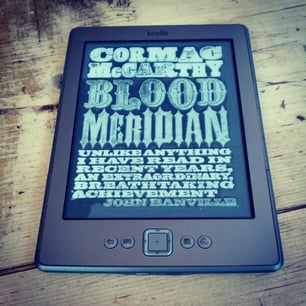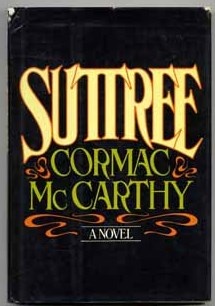In recent years, a string of successful film adaptations has brought the work of Cormac McCarthy into a wide, national spotlight. But to many of his dedicated readers, the crowning achievement of the author’s fifty-year career is his 1985 novel, Blood Meridian. The story concerns a band of Indian scalpers, circa 1850, and their campaign along the Mexican-American border. The novel’s vision, severely violent and infernal, has put many readers off, but galvanized all the more.
 Blood Meridian, to say the least, is a tale filled with bloodshed and carnage. It has been called by one reviewer—and perhaps with some affection—probably “the most violent book since The Iliad.” Even a significant portion of the book’s advocates consider the flavor of its content with some ambivalence. Harold Bloom, who called Blood Meridian “the major aesthetic achievement of any living American writer,” was so affected by the novel’s violence that it took him three attempts to complete it.
Blood Meridian, to say the least, is a tale filled with bloodshed and carnage. It has been called by one reviewer—and perhaps with some affection—probably “the most violent book since The Iliad.” Even a significant portion of the book’s advocates consider the flavor of its content with some ambivalence. Harold Bloom, who called Blood Meridian “the major aesthetic achievement of any living American writer,” was so affected by the novel’s violence that it took him three attempts to complete it.
The book is to some degree a catalog of violent deeds. People meet gruesome ends by the likes of scalping, crucifixion, disembowlment, explosion, and nearly everything else you can think of. The main character kills a barkeep by driving the broken-glass end of a bottle into his eye, all while the patrons look on. There is no shortage of horrifying conflict, and the depths of callousness its characters display allow the book to becomes a hellish descent into evil.
The purely gruesome and harrowing nature of the violence is made more difficult to stomach by the stark vision that presides over it. The reader of Blood Meridian is greeted by a trio of epigraphs, the final of which is a newspaper clipping about an anthropological excavation. The blurb concludes with the line: “A reexamination of a 300,000-year-old fossil skull found in the same region earlier shows evidence of having been scalped.” McCarthy proposes that the violence like we see in the book is more than history, its history predates even our formal existence as a species. Violence is instead our human nature and to escape from it is scarcely possible.
Part of the quality of the distant, often gnostic-godlike, voice of the book is that no belligerent side is favored. The white men are never heroes of freedom, but nor are they villains of political oppression. And the Indians they prey upon are not victims, but rather a people who bear in their hearts the same violence and brutality as the white scalpers. Blood Meridian is past the point of morals, and ultimately has neither the standards nor the interest to make its human subjects look good.
 Blood Meridian, if you couldn’t tell by now, is a work of thorough-going fatalism. The explicit description of killing and violence made all the more disturbing by the perspective behind it. We are introduced to the protagonist, known only as “the kid,” as unable to “read nor write, and in him broods already a taste for mindless violence.” The bestial interior of the kid is articulated to chilling effect. He goes to the tavern in New Orleans to fight sailors, to fight “Men whose speech sounds like the grunting of apes. Men from lands so far and queer that standing over them where they lie bleeding in the mud he feels mankind itself vindicated.” With such revelatory prose, who wouldn’t be terrified?
Blood Meridian, if you couldn’t tell by now, is a work of thorough-going fatalism. The explicit description of killing and violence made all the more disturbing by the perspective behind it. We are introduced to the protagonist, known only as “the kid,” as unable to “read nor write, and in him broods already a taste for mindless violence.” The bestial interior of the kid is articulated to chilling effect. He goes to the tavern in New Orleans to fight sailors, to fight “Men whose speech sounds like the grunting of apes. Men from lands so far and queer that standing over them where they lie bleeding in the mud he feels mankind itself vindicated.” With such revelatory prose, who wouldn’t be terrified?
The human perspectives of the novel are complemented by visions large enough to approach the cosmic. One bar fight in the book is rendered not as a culminating event but as an inevitable, almost simultaneous, blip in time. An argument happens among the men in the cantina, “…and how else could it be?” the narration asks, then answers itself: “How these things end. In confusion and curses and blood.” The immediate following sentences reset the scene at dawn, (“The men were gone, the whores were gone.”) with the characters finding their companion “with his skull broken in a pool of blood, none knew by whom.” Rarely has human agency been presented so ineffectual, so powerless, in the context of violence. It might be said that Cormac McCarthy takes the old, spurious self-defense argument one fatalistic step further. In Blood Meridian, “People don’t kill people; human nature does.”
 There is no single element that brings to life the novel’s vision of brutality like Judge Holden, the giant and hairless leader of the scalpers. “It makes no difference what men think of war,” he says in his central speech, “As well ask men what they think of stone. War was always here. Before man was, war waited for him.” The judge not only cedes to war its proper due, but praises it. “War is the ultimate game because war is at last a forcing of the unity of existence,” he says, “War is god.”
There is no single element that brings to life the novel’s vision of brutality like Judge Holden, the giant and hairless leader of the scalpers. “It makes no difference what men think of war,” he says in his central speech, “As well ask men what they think of stone. War was always here. Before man was, war waited for him.” The judge not only cedes to war its proper due, but praises it. “War is the ultimate game because war is at last a forcing of the unity of existence,” he says, “War is god.”
But for all Blood Meridian’s strength of philosophy, it fails to penetrate the acts of violence themselves. The ideas of the book are how we get to the most severe of violent acts, but they cease their operation as soon as the first club falls.
Cormac McCarthy once remarked in an interview that “The ugly fact is that books are made out of books.” The work that looms largest over the red-clay sand of this novel also happens to be McCarthy’s favorite, Moby Dick. The judge, who mirrors the whale in both paleness and hairlessness, has a kind of supernal, infernal quality to him. Yet the greatest nod to Melville’s book might be the way in which violence, like the white whale, plays with our expectation of meaning. It is a defiant symbol, the more richly rendered and the more it is pursued, the less it actually shows. We may anticipate a genius novelist to turn violence into something transcendent, but in the end it is not possible. Does violence mean anything? No. Not even McCarthy's genius can change that. No amount of artistry can add dignity to it. No search for the truth can make it more noble. It can only be known by the damage done.
I realize I have titled this article “In Praise” of Blood Meridian, while little, if anything, I have said has explicitly lauded the work. I have written most about what is unsettling, rather than elevating, about the novel. Yet to speak of this effect is to testify to the persuasiveness and power of the book. It is so large, so brilliant, that it bears being argued with. As a book so heavily influenced by the American tradition, may it one day give another author a chance to respond. McCarthy had taken great sages of American violence, like Faulkner and Melville, and said “yes, and there’s more.” For all of McCarthy’s fatalist violence, may we see a generation of authors who can say to this book, “yes, but there’s hope.”









